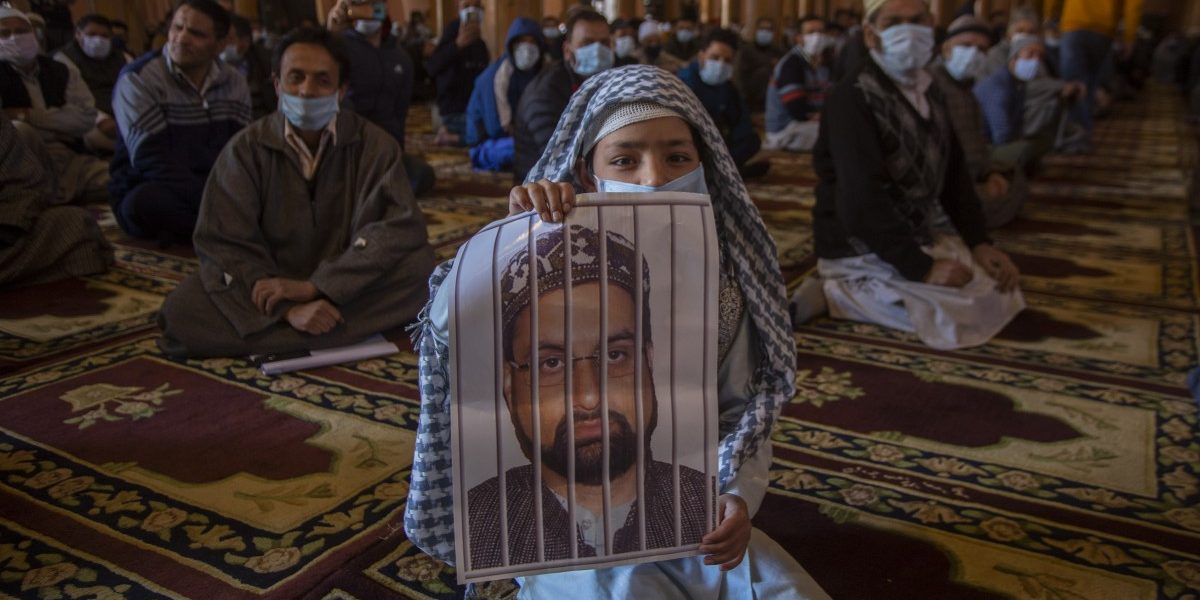Srinagar: More than three years after the BJP-led Union government unilaterally read down Article 370 of the Indian Constitution, senior Hurriyat leader Mirwaiz Umar Farooq continues to remain under detention at his Srinagar residence.
A Hurriyat official and a close aide of Mirwaiz’s said the authorities in Jammu and Kashmir have refused to specify the charges under which he has been confined to his Nigeen residence in Srinagar, the access to which is “restricted and monitored” by security agencies.
“He is being punished for seeking resolution of the Kashmir conflict through peaceful means. If there are any charges against him, he has the constitutional right to be aware of those charges so that he can avail all the judicial remedies,” Mirwaiz’s aide told The Wire.
A police van trundled into the lane that leads to Mirwaiz residence in Nigeen locality of Srinagar on August 4, 2019, a day before Article 370 was read down and the state of Jammu and Kashmir was downgraded into two union territories. “The van continues to remain deployed outside Mirwaiz’s residence. His basic human rights are suspended, which have obstructed his religious obligations. It is a matter of great pain to him and the Muslims of Kashmir,” the Hurriyat official said.
Confined to his residence along with mother, wife and two children, Mirwaiz has been allowed to walk out under heavy security cover for a couple of visits to a hospital, including for the COVID-19-vaccination, and a death in the family. Only a few select visitors, which includes close relations, are allowed to meet the Hurriyat leader.
While Mirwaiz’s passport has been impounded for years now, sources said his two children have been awaiting the renewal of their passports for the last two years. A Hurriyat spokesperson said in a statement that Mirwaiz’s arrest is an “arbitrary, despotic and extra judicial act of the authorities” and “gross violation of all his fundamental and basic human rights”.
J&K’s Director General of Police Dilbag Singh and Kashmir valley’s top cop Vijay Kumar didn’t respond to queries from The Wire about the charges under which Mirwaiz, who is also the chief cleric of Kashmir, has been put under house arrest. This story will be updated if and when they respond.

Mirwaiz Umar Farooq. Photo: Files
According to data shared by the Hurriyat Conference with The Wire, Mirwaiz has spent 1,521 days in detention since 2016 when the killing of the popular Hizbul Mujahideen commander, Burhan Wani, sparked a wave of mass protests in Kashmir which often turned violent. This includes nearly two months that Mirwaiz served at a sub-jail in Srinagar’s Chesham Shahi, as the protests in Kashmir, guided by the Hurriyat’s ‘protest calendar’, refused to die down.
However, while the Hurriyat leaders would walk in and out of jails or house detentions when J&K was ruled by popular governments, the separatist politics has been relegated to margins after the BJP-led Union government brought the erstwhile state under its direct control in 2019.
Mirwaiz was one of the few Hurriyat leaders to be involved in a dialogue by New Delhi after then Prime Minister Atal Bihari Vajpayee said that the talks with Pakistan over Kashmir would be held “under the ambit of humanity”.
Despite stiff opposition by the hawks in the Hurriyat Conference to his support for talks, and huge personal losses, including the assassination of his uncle Molvi Mushtaq in June 2004 and a grenade attack on his house on the same day, he continued leading the moderate faction of the Hurriyat in composite dialogue process during which he has met Vajpayee, former Prime Minister Manmohan Singh and former deputy prime minister L.K. Advani.
Following the talks, New Delhi also allowed the Hurriyat leaders to travel to Pakistan where they met the country’s political and security leadership.
“Our approach has been one of moving away from the binary of right and wrong, which precipitates the conflict, to looking at solutions by understanding the concerns and interests of all the three parties (India, Pakistan and people of J&K) to the dispute, and trying to address them through dialogue and deliberations to the satisfaction of all. This is difficult but the best peaceful option available. Its benefits include peace in the region and economic prosperity for all,” the Hurriyat official said.
Curbs were imposed on the movement of Mirwaiz, like many other leaders of Hurriyat and mainstream parties, on August 4, 2019, as the Union government anticipated widespread law and order problems, especially in the Kashmir Valley, against the constitutional changes being made to the state of J&K without the approval of its people.
While some of those leaders, including J&K’s three former chief ministers – Farooq Abdullah, Mehbooba Mufti and Omar Abdullah – have been set free, and others have been charged and languish in jails in J&K and other parts of the country, Mirwaiz is the only leader who continues to remain under house arrest.
According to Anjuman Auqaf, the managing body of Srinagar’s Jamia Masjid where Mirwaiz used to lead congregational prayers on Fridays and other important days in the Islamic calendar, the mosque has been shut by the authorities on 167 Fridays since 2016 and even Eid prayers have been completely banned starting with Eid-ul-Azha prayers of 2019.
“Jailing Kashmiri political leadership, cadres, activists, journalists, youth and people from different walks of life in jails across India, and using all forms of repressive measures to quell dissent or resistance, is a despotic approach to problem solving and futile in the long term,” the Hurriyat spokesperson said, urging the Government of India to release the prisoners “unconditionally”.
Featured image: A devotee holding a photograph of Kashmir’s chief cleric Mirwaiz Umar Farooq inside the grand mosque in old city Srinagar on March 5, 2021. Mirwaiz has been under continuous house detention for more than three years now. Photo: By arrangement
This article was first published on The Wire.

